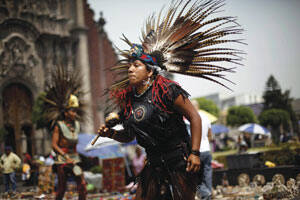As Mexico began bicentennial celebrations of its independence from Spain, the Mexican bishops’ conference issued a wide-ranging pastoral letter calling for a national reconciliation of centuries-old divisions over ethnicity, historical interpretations and the often strained relationship between church and state.
“One of the great pending tasks...is the reconciliation among all those that formed this great nation,” the bishops said in their letter of Aug. 30. Reconciliation with the past means “accepting our indigenous and European roots, especially Spanish [roots],” the bishops said. It also means “eliminating secular fundamentalism and religious intolerance of any kind.” The bishops urged action to fight the country’s rampant poverty and called for structural changes so that the country’s officially secular education system “becomes a true school of respect and appreciation of the cultural and religious differences.”
“The bishops of Mexico think that it would be a sin of omission to stay on the margins and keep silent about...history,” said Archbishop Alberto Suárez Inda of Morelia, president of the bishops’ commission on the bicentennial. “As citizens and as Christians we consider it a duty to join in the commemoration of these significant historic acts.”
The bishops published the letter as a booklet of 140 key points. The first points are dedicated to setting the record straight on the church’s complex role in the nation-shaping revolution against Spanish rule, which was fomented on Sept. 15, 1810, by a parish priest, the Rev. Miguel Hidalgo Costilla, and opposed at the time by the Catholic hierarchy. The letter acknowledged the hierarchy’s opposition but said that Father Hidalgo and another independence hero, the Rev. José María Morelos, were not excommunicated for their acts of rebellion, despite what is taught in Mexican public schools.
The letter also expressed a desire for today’s church to be an active player in national affairs. The bishops called on the political class to develop an “intellectual maturity” by putting aside personal and partisan interests for the national good. “We Catholics have the commitment to collaborate in the construction of this grand Mexican nation,” the bishops said. “We don’t want to be excluded nor much less exclude ourselves; we know we are identified with this people and this culture [as is] so clearly expressed in the mestizo face of Our Lady of Guadalupe,” they said.
Mexico’s bishops marked independence on Sept. 1 at the Basilica of Our Lady of Guadalupe. Special Masses were planned in each diocese on Sept. 15, the day Mexicans traditionally gather after dark to watch re-enactments of Father Hidalgo’s grito, or shout, for independence made from his parish in the state of Guanajuato.
Even as celebrations of Mexico’s past continued, its troubled present was not far from the minds of Mexican Catholics. In the northeastern Mex-ican state of Tamaulipas prayers were offered for 72 undocumented migrants whose bodies were discovered on Aug. 24 after what was possibly the largest mass slaying since Mexico began cracking down on drug cartels and organized crime.








